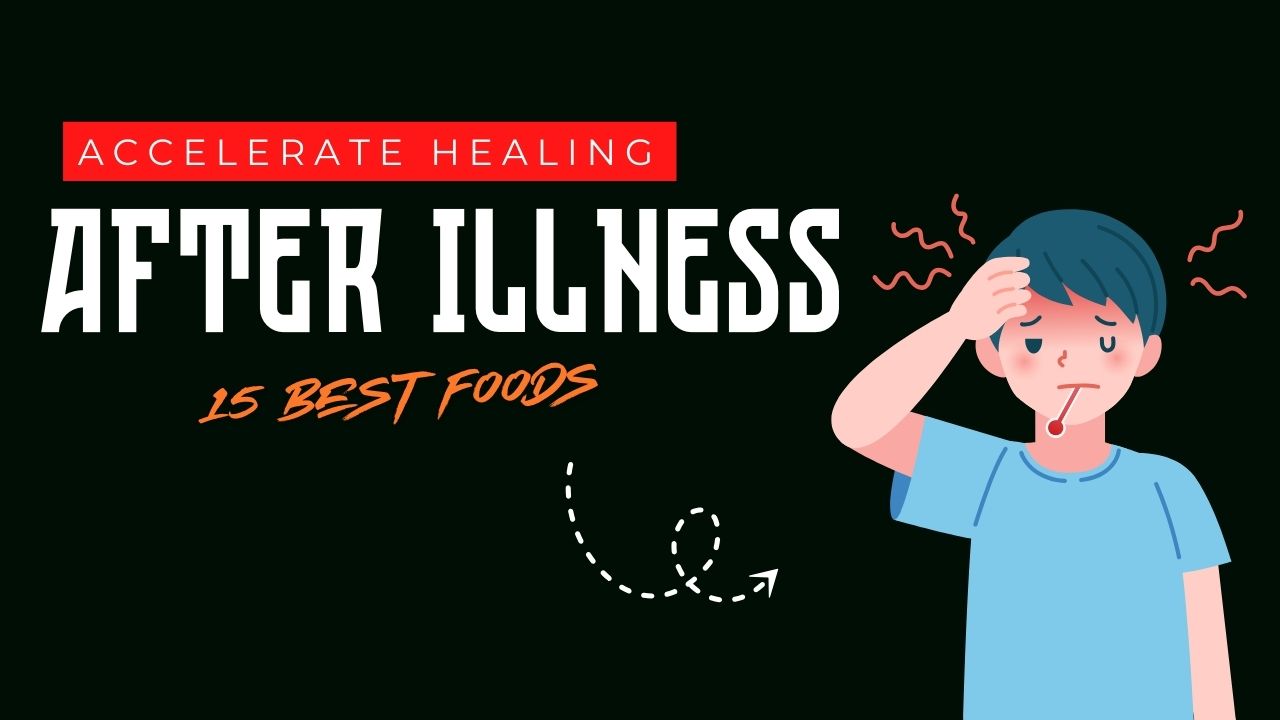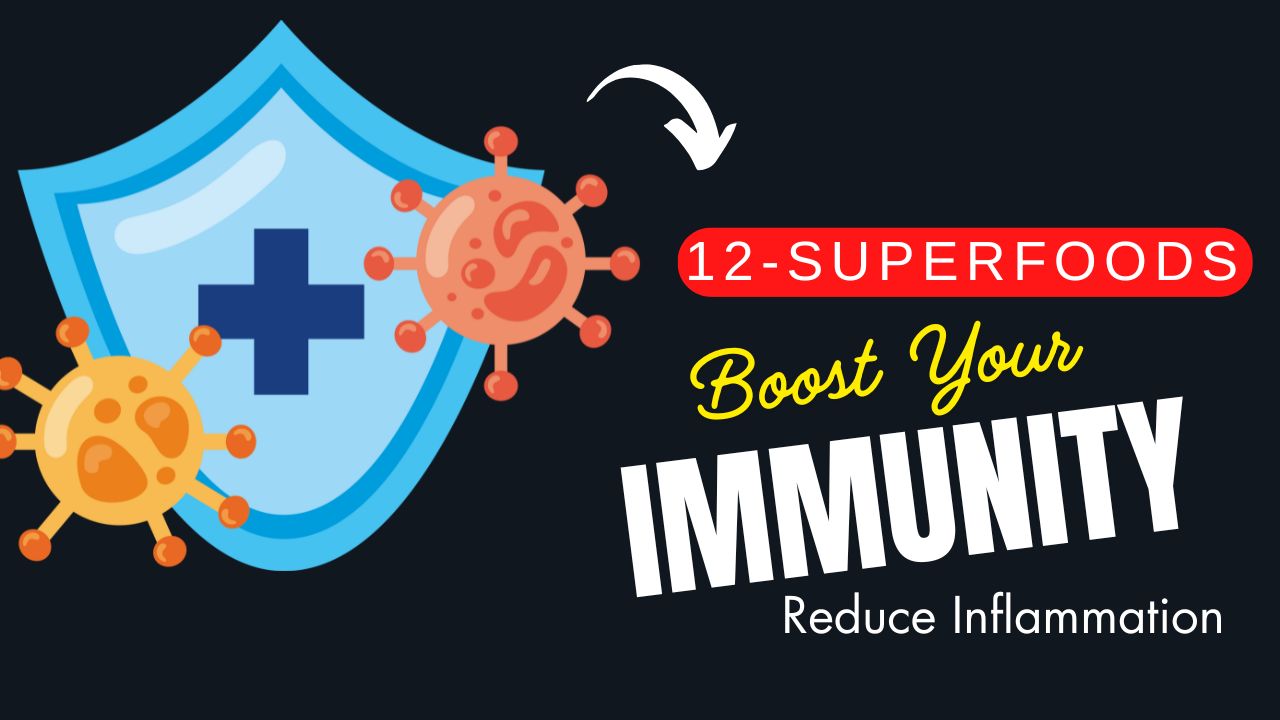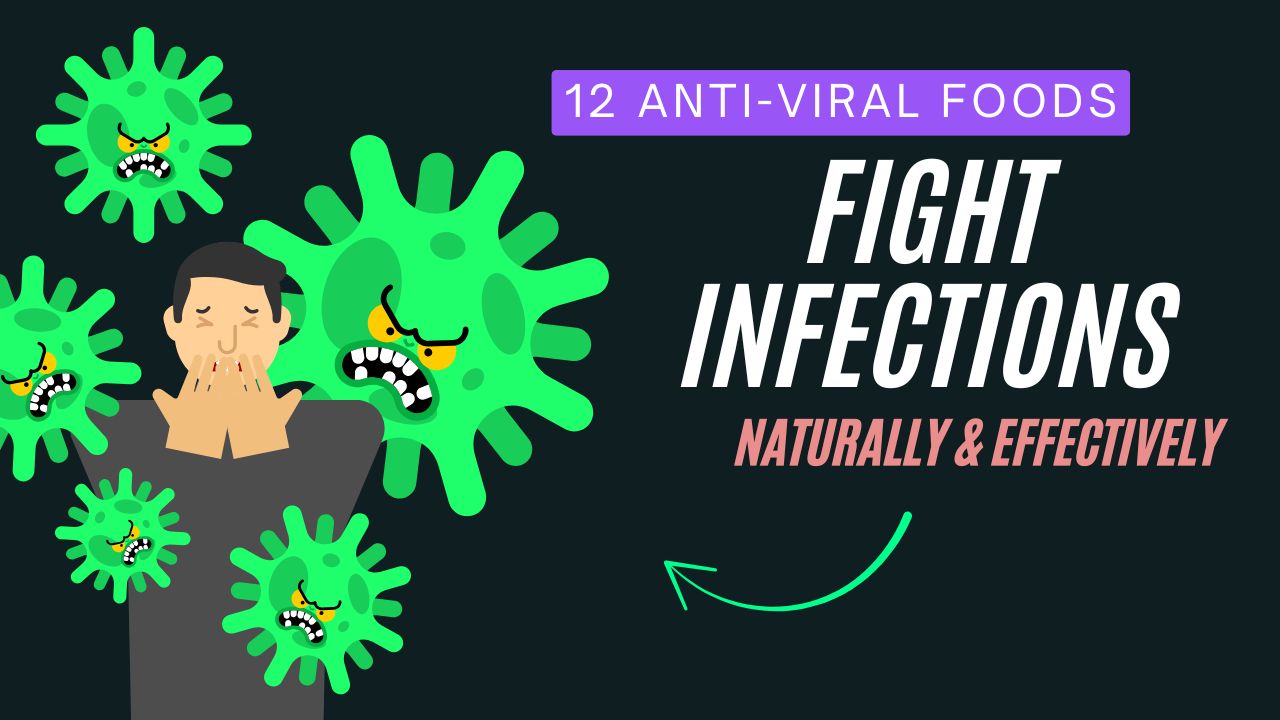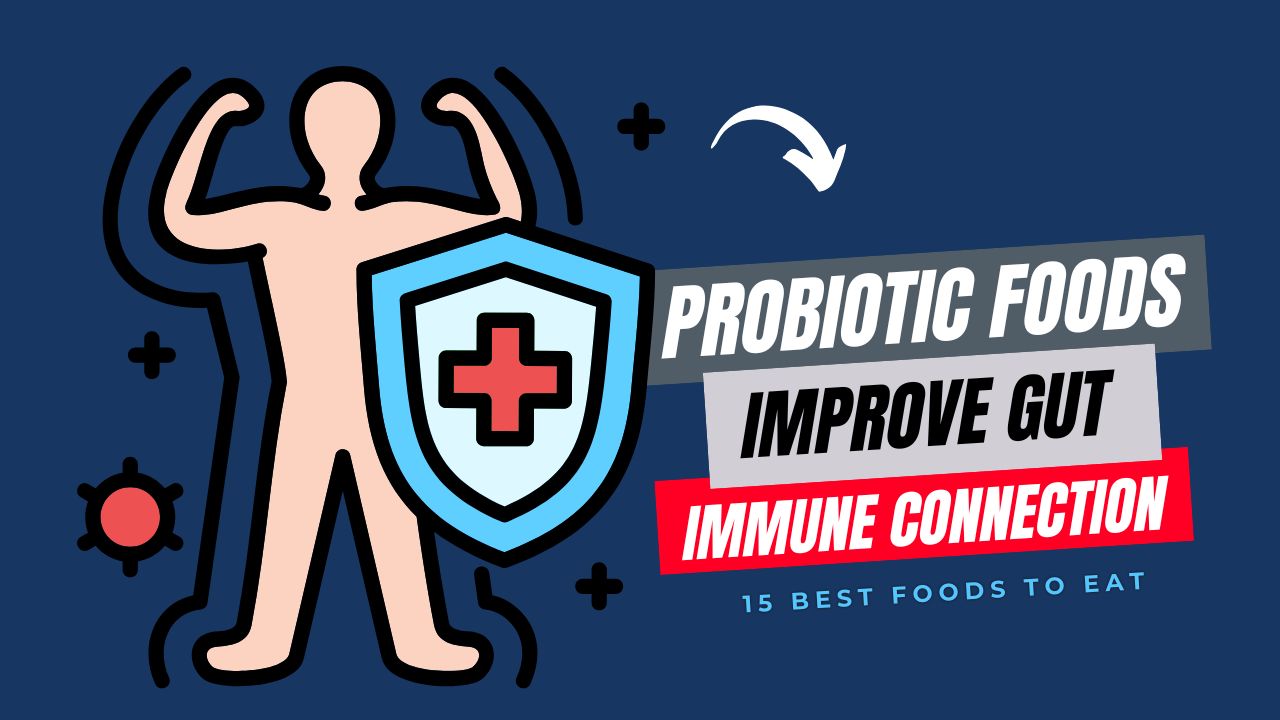Did you know that your kitchen might hold some of the most powerful defenses against viruses and infections?
For centuries, cultures across the world have relied on natural foods and herbs to strengthen the immune system long before modern medicine became mainstream.
In fact, many foods we consider “ordinary” are packed with compounds that actively help the body resist viral attacks, soothe inflammation, and speed up recovery.
Struggling with frequent colds, seasonal flu, or low energy? Instead of depending solely on over-the-counter remedies, adding certain anti-viral foods to your diet can act as a natural shield.
These foods aren’t just about protection—they also bring along added benefits like better digestion, improved skin, balanced energy levels, and reduced risk of chronic diseases.
In this article, we’ll explore 12 anti-viral foods to fight infections naturally, covering:
- The science behind each food’s infection-fighting ability
- Best ways to eat or use it
- Who should include it (and who should avoid it)
- Storage and buying tips
- Quick do’s and don’ts
- Possible side effects you should know
Let’s dive in and discover how you can transform everyday meals into powerful medicine for your immune system.
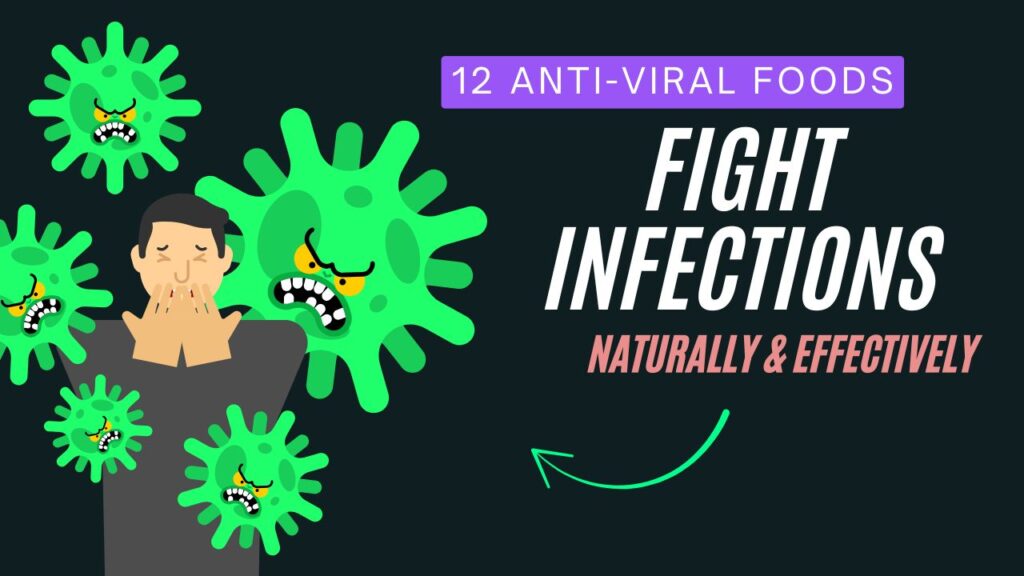
Table of Contents
12 Best Foods To Fight Infections
1. Garlic
Garlic has been used for centuries as a “natural antibiotic.” Its sulfur compounds, particularly allicin, have strong anti-viral, anti-bacterial, and anti-fungal properties.
Best Ways to Eat or Use It
- Crush raw garlic and add it to salads or dips for maximum potency.
- Mix into soups or broths, added at the end to retain compounds.
- Blend into smoothies with lemon and ginger for an immune-boosting shot.
Who Should Eat / Avoid
- Good for: those prone to frequent colds, heart patients (supports circulation), and anyone seeking a natural immunity boost.
- Avoid/Limit if: you have stomach ulcers, GERD, or are on blood-thinning medications.
Storage & Buying Tips
- Choose firm bulbs with no green shoots.
- Store in a cool, dry, and ventilated place—not in the fridge.
Do’s & Don’ts
✅ Do: crush and let it sit for 10 minutes before cooking to activate allicin.
❌ Don’t: overcook, as heat reduces its antiviral compounds.
Possible Side Effects
Excessive raw garlic may cause stomach upset, heartburn, or bad breath.
2. Ginger
A root celebrated in Ayurveda and Chinese medicine, ginger contains gingerols and shogaols, compounds with strong anti-inflammatory and anti-viral action.
Best Ways to Eat or Use It
- Brew fresh ginger tea with honey and lemon.
- Add grated ginger to stir-fries or soups.
- Blend into smoothies for a spicy immunity boost.
Who Should Eat / Avoid
- Good for: pregnant women (relieves nausea), athletes (anti-inflammatory), and those with colds or flu.
- Avoid/Limit if: you have gallstones or take blood-thinning medication.
Storage & Buying Tips
- Buy firm, wrinkle-free roots.
- Store in the fridge wrapped in paper towel or freeze for long-term use.
Do’s & Don’ts
✅ Do: use fresh ginger for stronger compounds.
❌ Don’t: rely solely on ginger powder for medicinal effects.
Possible Side Effects
Overuse may lead to heartburn, diarrhea, or blood-thinning effects.
3. Turmeric
Turmeric’s golden pigment, curcumin, has antiviral, antibacterial, and strong antioxidant properties. It also enhances the body’s defense against respiratory infections.
Best Ways to Eat or Use It
- Golden milk (turmeric latte) with black pepper and warm milk.
- Add to curries, soups, and stews.
- Blend into smoothies with pineapple or mango.
Who Should Eat / Avoid
- Good for: those with weak immunity, joint pain, or skin issues.
- Avoid/Limit if: you have gallbladder disease or are on blood thinners.
Storage & Buying Tips
- Use fresh root for maximum benefits.
- Store ground turmeric in airtight containers away from sunlight.
Do’s & Don’ts
✅ Do: pair with black pepper for better curcumin absorption.
❌ Don’t: consume in very high amounts—can upset digestion.
Possible Side Effects
Too much may cause nausea, stomach cramps, or interfere with medication.
4. Citrus Fruits (Lemon, Orange, Grapefruit)
Citrus fruits are rich in vitamin C, a nutrient well-known for boosting white blood cells, which defend the body against infections.
Best Ways to Eat or Use It
- Freshly squeezed juices.
- Add lemon to warm water in the morning.
- Toss orange slices into salads.
Who Should Eat / Avoid
- Good for: smokers (to restore vitamin C), children, and anyone prone to frequent colds.
- Avoid/Limit if: you have acid reflux or citrus allergies.
Storage & Buying Tips
- Choose heavy fruits with firm skin.
- Store in the fridge to extend freshness.
Do’s & Don’ts
✅ Do: consume raw for maximum vitamin C.
❌ Don’t: expose juice to air for too long—vitamin C degrades quickly.
Possible Side Effects
Overconsumption may erode tooth enamel or upset stomach acidity.
5. Green Tea
Green tea contains catechins, especially EGCG, which show strong antiviral activity against flu viruses.
Best Ways to Eat or Use It
- Drink freshly brewed green tea (not bottled).
- Add lemon to enhance antioxidants.
Who Should Eat / Avoid
- Good for: weight-loss seekers, students (boosts focus), and adults seeking daily immunity.
- Avoid/Limit if: you are caffeine-sensitive or have insomnia.
Storage & Buying Tips
- Buy loose-leaf tea for quality.
- Store in airtight tins away from sunlight.
Do’s & Don’ts
✅ Do: steep for 2–3 minutes for best flavor and nutrients.
❌ Don’t: over-steep, which makes it bitter and less beneficial.
Possible Side Effects
Too much may cause caffeine jitters, anxiety, or iron absorption issues.
6. Blueberries
Blueberries contain flavonoids that help strengthen the respiratory tract and reduce viral risk.
Best Ways to Eat or Use It
- Add to oatmeal or yogurt.
- Blend into smoothies.
- Eat fresh as a snack.
Who Should Eat / Avoid
- Good for: kids, heart patients, and people prone to seasonal flu.
- Avoid/Limit if: you’re on blood-thinning medication.
Storage & Buying Tips
- Buy firm, plump berries.
- Store in fridge and wash only before eating.
Do’s & Don’ts
✅ Do: eat fresh or frozen.
❌ Don’t: add too much sugar when making jams or desserts.
Possible Side Effects
Overeating may cause stomach upset or interact with certain medications.
7. Mushrooms
Particularly shiitake and reishi mushrooms boost white blood cell activity and have antiviral properties.
Best Ways to Eat or Use It
- Add to soups, stir-fries, or stews.
- Grill or sauté with garlic.
Who Should Eat / Avoid
- Good for: vegetarians (immune boost), older adults.
- Avoid/Limit if: you have mold allergies.
Storage & Buying Tips
- Choose firm, unblemished mushrooms.
- Store in paper bags in the fridge.
Do’s & Don’ts
✅ Do: cook lightly to preserve nutrients.
❌ Don’t: wash mushrooms too early—they absorb water.
Possible Side Effects
Some mushrooms may cause allergies or interact with medications.
8. Coconut Oil
Contains lauric acid and monolaurin, compounds shown to disrupt viral membranes.
Best Ways to Eat or Use It
- Add to smoothies.
- Use in cooking as a substitute for refined oils.
- Add a spoonful to coffee (bulletproof coffee).
Who Should Eat / Avoid
- Good for: athletes (quick energy), keto diet followers.
- Avoid/Limit if: you have high cholesterol.
Storage & Buying Tips
- Buy cold-pressed virgin coconut oil.
- Store at room temperature.
Do’s & Don’ts
✅ Do: use in moderation.
❌ Don’t: deep fry with coconut oil—it has a low smoke point.
Possible Side Effects
Overuse can lead to high cholesterol or digestive discomfort.
9. Pomegranate
Rich in polyphenols, pomegranate juice has antiviral and antibacterial effects, particularly against flu viruses.
Best Ways to Eat or Use It
- Eat fresh seeds.
- Drink pure juice (without added sugar).
- Add to salads.
Who Should Eat / Avoid
- Good for: heart health, kids, and pregnant women.
- Avoid/Limit if: you are on blood pressure-lowering medications.
Storage & Buying Tips
- Choose heavy fruits with intact skin.
- Refrigerate seeds or juice in airtight containers.
Do’s & Don’ts
✅ Do: eat seeds along with juice for fiber.
❌ Don’t: buy packaged juices with added sugar.
Possible Side Effects
May lower blood pressure excessively in some individuals.
10. Honey
Raw honey contains antioxidants and natural enzymes that fight bacteria and viruses.
Best Ways to Eat or Use It
- Add to warm teas or lemon water.
- Drizzle on yogurt, oats, or fruits.
Who Should Eat / Avoid
- Good for: children over 1 year, sore throat relief seekers.
- Avoid/Limit if: under 1 year old (risk of botulism).
Storage & Buying Tips
- Buy raw, unprocessed honey.
- Store in airtight jars at room temperature.
Do’s & Don’ts
✅ Do: use in moderation.
❌ Don’t: mix with boiling water (destroys enzymes).
Possible Side Effects
High sugar content—avoid overuse if diabetic.
11. Spinach
A powerhouse of vitamin C, vitamin E, and antioxidants, spinach boosts immune function and helps ward off infections.
Best Ways to Eat or Use It
- Add to salads, omelets, or smoothies.
- Lightly sauté with olive oil and garlic.
Who Should Eat / Avoid
- Good for: athletes, kids, weight-loss seekers.
- Avoid/Limit if: you have kidney stones (high oxalates).
Storage & Buying Tips
- Buy crisp, green leaves.
- Store in fridge wrapped in paper towels.
Do’s & Don’ts
✅ Do: eat raw or lightly cooked.
❌ Don’t: overcook—it destroys vitamin C.
Possible Side Effects
Overconsumption may cause kidney stone formation in sensitive individuals.
12. Yogurt (with Probiotics)
Probiotic-rich yogurt enhances gut health, which directly impacts immune strength and viral defense.
Best Ways to Eat or Use It
- Eat plain with fruits or honey.
- Add to smoothies or dips.
Who Should Eat / Avoid
- Good for: digestive health, kids, adults with low immunity.
- Avoid/Limit if: lactose intolerant (opt for lactose-free versions).
Storage & Buying Tips
- Buy unsweetened yogurt with “live cultures.”
- Store in the fridge and check expiry dates carefully.
Do’s & Don’ts
✅ Do: eat regularly for gut health.
❌ Don’t: buy heavily sweetened flavored varieties.
Possible Side Effects
Overconsumption may cause bloating in lactose-sensitive individuals.
Conclusion
Nature has provided us with a variety of anti-viral foods that can help the body naturally resist infections, strengthen immunity, and promote long-term health. From the powerful punch of garlic and turmeric to the soothing benefits of yogurt and honey, each food plays a unique role in defending against viruses.
The best part? These foods aren’t exotic or hard to find—you probably already have most of them in your kitchen. All it takes is consistency in including them in your daily meals to build resilience naturally.
Start simple: add garlic to tonight’s soup, sip on green tea instead of soda, or snack on a handful of blueberries. Small steps can create big changes for your health.
What’s your favorite way to include these immune-boosting foods in your diet? Share your recipe or tip in the comments—we’d love to hear how you make healthy eating delicious.
Frequently Asked Questions (FAQs)
What are anti-viral foods?
Anti-viral foods are natural foods rich in compounds that help the body fight viruses, strengthen immunity, and reduce the risk of infections. Examples include garlic, ginger, turmeric, and citrus fruits.
Can anti-viral foods replace medicine?
No. Anti-viral foods support immunity and reduce infection risk but should not replace prescribed medical treatments. They work best as part of a balanced diet and healthy lifestyle.
How often should I eat anti-viral foods?
For maximum benefit, include a variety of anti-viral foods daily—such as adding garlic to meals, drinking green tea, or eating fresh fruits. Consistency matters more than quantity.
Are anti-viral foods safe for children?
Yes, most anti-viral foods like fruits, yogurt, and honey (for kids over 1 year) are safe for children. Always consult a pediatrician if your child has allergies or medical conditions.
Can I eat all 12 foods every day?
While it’s possible, moderation is key. Some foods like garlic, ginger, or green tea may cause side effects in excess. It’s best to rotate them throughout the week.
Do cooking methods affect anti-viral properties?
Yes. Overcooking may reduce certain nutrients (like vitamin C in citrus or spinach). Light cooking, steaming, or eating raw is often best for retaining antiviral compounds.
Which anti-viral food is the most powerful?
Garlic and turmeric are among the strongest, but the best results come from combining multiple foods like citrus, ginger, and yogurt for a balanced effect.
Who should avoid anti-viral foods?
People with specific medical conditions (e.g., GERD, kidney stones, gallbladder disease) or those on certain medications (like blood thinners) should limit some foods. Always consult your doctor before making major diet changes.
Can these foods prevent seasonal flu and colds?
They can strengthen your immune system, making it harder for viruses to spread in your body. However, they are not a guaranteed prevention method.
Is it better to take supplements instead of foods?
Whole foods are always better since they provide a combination of nutrients and compounds. Supplements can be useful if prescribed, but they shouldn’t replace real food.





